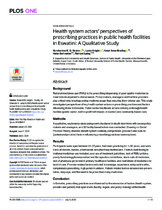| dc.description.abstract | Rational medicines use (RMU) is the prescribing/dispensing of good quality medicines to meet individual patient's clinical needs. Policy-makers, managers and frontline providers play critical roles in safeguarding medicine usage thus ensuring their rational use. This study investigated perspectives of key health system actors on prescribing practices and factors influencing these in Eswatini. Public sector healthcare service delivery is through health facilities (public sector, not-for-profit faith-based, industrial) and community-based care. Methods A qualitative, exploratory study using semi-structured in-depth interviews with seven policymakers and managers, and 32 facility-based actors was conducted. Drawing on Social Practice Theory, material (health system context), competence (provider) and cultural (patient and provider) factors influencing prescribing practices were explored. Results Participants were aged between 21-57years, had been practicing for 1-30 years, and were a mix of doctors, nurses, pharmacists and pharmacy-technicians. Factors contributing to irrational medicines use included: Poor use of treatment guidelines, lack of RMU policies, poorly-functioning pharmaceutical and therapeutics committees, stock-outs of medicines, lack of pharmacy personnel in primary healthcare facilities, and restrictions of medicines by level of care. Provider-related factors included: Knowledge, experience and practice ethic, symptomatic prescribing, high patient numbers. | en_US |

